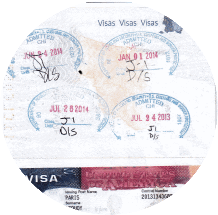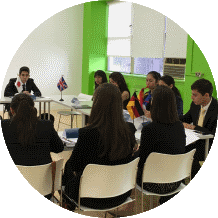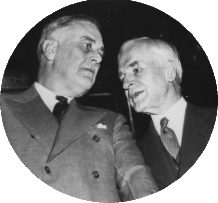| FREQUENTLY ASKED QUESTIONS |
| english français español chinese |
What is the CHF Teacher Exchange Program? What are the requirements for acceptance into the CHF Exchange Visitor Teacher Program? The school, district or state must set up a CHF J-1 visa teacher exchange program if there is not already an existing one. See the Instruction Video page on this website to find the video explaining this procedure. Schools must be primary or secondary accredited educational institutions in the United States. Registration in a particular state or filing Articles of Incorporation does not accredit a school. School exemption from certification does not apply in this case, as it is required by the J-1 visa regulations. The school, district or state must cover CHF exchange visitor sponsorship fees, which are listed on the home page of this website. How may I contact the Cordell Hull Foundation to apply or to ask questions? (1) Read this page to learn about how the J-1 exchange visa program works: Step by Step Setup Guide Or watch the New Program Video. See J1 VISA link at the top of this webpage and click on INSTRUCTION VIDEOS to obtain the most recent link in English, French, Spanish or Mandarin. (6) General questions from teachers submitting unsolicited applications are answered only after teachers first complete the CHF Teacher Application form. *Note: The 2-year BAR is in addition to the 2-year residency requirement; in other words, 2 years required to stay outside the US before returning to the US in J-1 visa status – no possibility of waiver. May I request placement in a particular state or region of the U.S.? Teachers may find job opportunities by attending international job fairs in the country or origin or researching teacher personnel search firms on the Internet. If you wish to target a certain city or region, and obtain a teaching job offer, CHF will then consider setting up a teacher exchange program with the school or district. In that event, please have the school or district contact us directly. We do not allow individual teachers to cover the costs of CHF exchange teacher sponsorship. Where can I find out about other teachers’ experiences? What costs do teachers incur after being accepted into the Teacher Exchange Program? Most exchange teachers pay airfare to the U.S. and sometimes cover consular processing fees at the American Embassy abroad to obtain the J-1 visa passport stamp. Currently, those fees are the SEVIS 901 fee https://www.fmjfee.com/index.jhtml and the DS-160 visa processing fee of $160 form DS-160, using the Internet link: https://ceac.state.gov/ceac Plus a courier fee for an envelope to return the passport from the American Embassy after the J-1 visa stamp is imprinted of $15-$30, depending upon the country. Note: During a possible 3-year J-1 exchange visa term, only pay the SEVIS fee once. J-2 dependents of the teacher do NOT pay the SEVIS fee. You may be asked to purchase a pre-paid courier envelope to mail the passport back after consular review. Some countries, such as India, tack on additional small fees. Be sure to read the instructions on the website of the specific American Embassy where you plan to apply. You can find links to various American Embassy websites at: https://www.usembassy.gov/ What is the process to get a J-1 Visa stamp in my passport? The Cordell Hull Foundation provides the necessary documents and instructions for the exchange teacher candidate including a properly executed DS-2019 form. The teacher goes online to the website of the nearest U.S. Embassy in the country of origin or in the country of current residence to make an in-person appointment to interview with the American Embassy consular officer and submits the application package for approval of J-1 teacher visa status. The American Embassy charges two fees to process the visa. One is a visa stamp fee plus the SEVIS fee, paid separately online. Check the American Embassy website of your country of origin for more details. See What costs do teachers incur after being accepted into the Teacher Exchange Program? Applicants must make an appointment for an interview with a consular officer. J-1 visa stamps cannot be obtained anywhere in the United States, nor can you renew your J-1 visa inside the United States. Since the J-1 is a non-immigrant visa, the burden of proving “non-intention to immigrate” falls upon the teacher applicant. In countries where the preponderance of non-immigrant visa applicants do not return to their home countries, that burden of proof is heavier. Canadians are currently exempted from going to the American Embassy for J-1 visa stamps. Most European and Anglophone countries require only basic visa support documents from CHF and the standard Embassy application forms. Consular Office (visa) procedures and policies change frequently and without notice. If necessary, CHF will consult you in countries where the consular officers impose more scrutiny, offering tips on how to navigate the ever-increasingly complicated visa process. In those countries, for example, starting in 2019 they will ask if you have read a pamphlet that you were instructed to read in advance and ask you questions about that pamphlet. If you have not read it, they will send you back to the waiting room to read it and come back to finish the interview. So far, this kind of close screening does not occur in European countries or Anglophone countries (where the native language is English, i.e. UK countries, Australia, New Zealand). What forms do I fill out to take to the American Consular office to get my J-1 visa passport stamp? You will need receipts for advance payment of the two visa fees to the American Consulate and SEVIS. Check the website of the American Embassy in your home country to download these documents. CHF includes a letter of instruction when forwarding the necessary backup paperwork to exchange teachers accepted into the program. Read the specific procedure on the American Embassy website and follow the instructions. Additional documents may be requested for non-immigrant visas in certain countries. Are family members allowed to accompany me to the U.S.? If the J-2 visa holder is in correct status, s/he may apply for a work permit (EAD) after arriving in the U.S. and applying for a social security number. Form I-765 may be downloaded, fee paid by credit card and emailed directly to the Internal Revenue service. Interactive Form EI-765 can be submitted online: www.uscis.gov/i-765 CHF does not guarantee visas for dependent relatives nor work permits. Also, regulations require health-insurance coverage of $100,000 per accident or illness with a deductible not larger than $500 for every family member. That is very expensive, depending upon whether your school supports those costs. They often pay most of the teacher’s health insurance premiums, but not family dependents. In some schools, the school plan is $500 per month per J-2 dependent. See our blog for a chart showing minimal costs: http://j1ivisateachexc.blogspot.com Note that day-care in the US for children below school age is not free. That expense is prohibitive for most foreign teachers. Most foreign teachers will not be living in a US city where they have sisters, brothers, aunts, uncles, parents, grandparents, etc. to babysit and call on to help take care of very young children. You will not have that family infrastructure in the US. By inborne nature, parents are preoccupied in caring for very young children, allowing scarce time to adapt to the American school curriculum and new way of teaching, nor to find time to make friends and interact with our culture, which is the purpose of the J-1 visa: Cultural Exchange. The J-1 visa is a cultural exchange visa, not a work visa. Teachers are expected to expend energy to improve their English and to make friends with Americans while participating in our exchange, not to communicate exclusively with other people living here who speak their native language and wall themselves off from participating in American culture and only speak their native language both in schools (because CHF sponsors mostly language immersion and foreign language teachers), at home, and socially. When requesting a work permit, the dependent must explain why the income is not needed to support the family, only for the dependent’s enhancement or to improve the family’s overall standard of living. The maximum number of dependents allowed is three: spouse and 2 children or 3 children (over age 6). If an exchange visitor requests four dependents, proof of additional income for each child of at least $7,000 per year must be demonstrated, and not automatically granted. What is the purpose of the Teacher Exchange Program? What is a J-1 visa? What is a J-1 sponsor? What is a DS-2019 form? What are CHF’s guidelines and requirements for schools? How can our school establish a J-1 Exchange Program? You will receive an email response. CHF can offer candidates from our database or work with applicants in whom you are interested. Upon request, a contract can include setting up customized recruiting arrangements in specific countries using CHF multilingual staff and/or selection committees in the foreign country. As a 501(c)(3) non-profit corporation, CHF is not a personnel agency and do not seek jobs for individual teachers. We do not charge a percentage for teacher placement. A monitoring visit is generally arranged at the school or district office to meet the staff and/or exchange teacher(s) sponsored by CHF, preferably in advance of setting up the exchange program, depending upon the school location and travel schedule of CHF monitors. Participating schools must be certified as educational institutions at the elementary and/or secondary level. Day-care facilities are not eligible for J-1 exchange visitor teacher visas. Uncertified schools, though exempt from state certification, are ineligible for sponsorship of J-1 teacher visas. Are teachers sponsored on a J-1 exchange visitor visa tax-exempt? All J-1 visaholders are exempt from Social Security and Medicare taxes for at least the first year and first semester of the second year. Publication 901: U.S. TAX Treaties CHF does not guarantee tax advice, only directs educators toward publications and forms that may be helpful. You can ask your school directly what the percentage of state and local tax that they will deduct from your check. Since the Cordell Hull Foundation does not pay the teacher salary, we do not have those specific deduction figures. https://www.irs.gov/individuals/international-taxpayers/exempt-individuals-teachers-and-trainees A teacher is defined here as an individual, other than a student, who is temporarily in the United States under a “J ” or “Q ” visa and substantially complies with the requirements of that nonimmigrant status. Also Included Are Immediate Family Members of Exempt Teachers If any J-2 dependents are approved for sponsorship by CHF, members of the immediate family include the individual’s spouse and unmarried children up to age 20 (whether by blood or adoption), but only if the spouse’s or unmarried children’s nonimmigrant statuses are derived from, and dependent on, the exempt individual’s nonimmigrant status. Unmarried children are included only if they meet all the following:
The immediate family of an exempt individual does not include attendants, servants, or personal employees. When a Teacher is Not Exempt You will not be an exempt individual as a teacher if you were exempt as a teacher, trainee, or student for any part of 2 of the 6 calendar years preceding the current year. However, you will be an exempt individual if you were exempt as a teacher, trainee, or student for any part of 4 (or fewer) of the 6 preceding calendar years and:
A foreign employer includes an office or place of business of an American entity in a foreign country or a U.S. possession. If you qualify to exclude days of presence as a teacher or trainee, you must file a fully-completed Form 8843, Statement for Exempt Individuals and Individuals with a Medical Condition with the IRS. Form 8843 may be attached to your U.S. federal income tax return for the tax year, or it may be mailed separately to the address indicated in the General Instructions attached to the Form 8843. Example: Carla is temporarily present in the United States as a teacher in J-1 nonimmigrant status. She entered the United States on August 15, 2012, and is employed by a university in California. She has never been in the United States prior to this visit. Carla is an Exempt Individual for calendar years 2012 and 2013 because during those two years she meets the test that prior to the current year she was not present during two years in the United States in F, J, M, or Q nonimmigrant status during the 6 calendar years prior to the current year. However, for calendar year 2014 she is no longer an Exempt Individual because she was present during two years in the United States in F, J, M, or Q nonimmigrant status during the 6 calendar years preceding the current year. For calendar year 2014, Carla must count her days of presence in the United States for the purpose of passing the Substantial Presence Test. What are the steps to obtain the J-visa paperwork and instructions from the Cordell Hull Foundation after our school or school district has established a working agreement with CHF? J-1 visa initial application process What are the Health Insurance requirements? HEALTH INSURANCE REQUIREMENTS FOR J-1 AND J-2 EXCHANGE VISITORS (EVs) Pursuant to 22 CFR Part 62.14, adequate Health Insurance coverage is mandatory for EVs and their dependents for the duration of the program. Specific minimum coverage provisions for your health insurance policy while in the US must include: (1) medical benefits of at least $100,000 per accident or illness; (2) repatriation of remains in the amount of $7,500; (3) expenses associated with medical evacuation of the exchange visitor to his or her home country in the amount of $10,000; and (4) a deductible not to exceed $500. Medical insurance must be maintained throughout your entire Exchange Visitor Program. Failure to maintain the above health insurance minimums will render the EV out of status and constitutes grounds for removal from the program. Sample Health Insurance Providers: What do I do when I first arrive in the United States? First send to the Cordell Hull Foundation: Only after you send this information, will you be cleared to apply for your Social Security Number at the U.S. Social Security administration office 24-48 hours from the next business day after you inform us. Go online to www.socialsecurity.gov and input your zip code to find the office nearest you. If you already have obtained a Social Security Number, you must use that older number. However, you are still not eligible to work in the United States until you provide your immediate contact information and proof of current health insurance. You can find the specific health insurance requirements on: http://j1visateachexc.blogspot.com For more information on obtaining your SSN, see www.cordellhull.com/social-security IMPORTANT: After you have your permanent address and cell phone number, you must complete the online CHF Datasheet form which only takes 3 minutes – https://cordell-hull.org/datasheet/ Fill in all available information and click the SUBMIT button at the bottom of the page. How long can I stay in the US if I leave after the first, or second, year? As we explain at all our new-teacher orientations, your J-1 teacher visa status automatically ends on June 30 of the academic school year. You have a 30-day grace period to stay in the US, until July 30. During the grace period, you can travel or wrap up your affairs, but not work. And, of course, if you leave the US during these 30 days, you cannot re-enter in J-1 visa status for two full additional years. |






